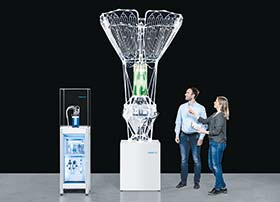

Algae are small climate savers. Even in their natural state they are extremely efficient photosynthesisers and absorb ten times more carbon dioxide than land plants. In bioreactors equipped with appropriate sensors, control technology and automation, the efficiency of algae can be increased to a hundred times that of land plants. This shows that they have a significant potential for a climate-neutral circular economy. The PhotoBionicCell research project, part of the Festo Bionic Learning Network, is demonstrating a potential approach for industrial biologisation in the future. “Our aim is to make a significant contribution to the quality of life of today’s and future generations through the large-scale cultivation of biomass using our automatic technology,” says Dr. Elias Knubben, Festo vice president of Corporate Research and Innovation.
Algae are automatically cultivated and their growth controlled in the bioreactor. The algae liquid is pumped upwards into the surface collectors where it is distributed in an even flow and then flows back to the cultivator. During this circulation, the algae cells, through photosynthesis in their chloroplasts, convert sunlight, carbon dioxide and water into oxygen and chemical energy carriers, or organic recyclable materials. That is how biomass is cultivated in a closed cycle, which is highly efficient and conserves resources.
Efficient photosynthesis in the high-tech bioreactor
The combination of tried and tested open-loop and closed-loop control systems with state-of-the-art automation components creates the ideal conditions for the microorganisms. An integrated gassing concept ensures that the carbon dioxide from the air is evenly distributed into the circulating biofluid.
A major challenge for bioreactors is how to determine the volume of biomass precisely. Festo’s developers are using a quantum technology sensor supplied by the startup company Q.ANT to do this. It returns accurate information on the growth of the organisms in real time. Using microfluidics, the algae are automatically and continuously pumped past the sensor. The quantum sensor is able to optically detect individual cells so that the amount of biomass can be determined exactly. In addition, it examines the cells for their vitality. Only then is it possible to react to process events in advance and to regulate them.
Biological recyclable materials for climate-neutral end products
Depending on the nutrients fed to the algae biomass, the products that are formed as part of the metabolic processes are fatty acids, colour pigments and surfactants. They can be used as the starting materials for the production of medicines, foodstuffs, plastics, cosmetics or fuels. Unlike petroleum-based products, biologically-based end products can usually be biodegraded and, in keeping with an overall circular economy, recycled in a climate-neutral process.
Festo’s researchers have also focused on the cultivation of the blue-green algae in their work for the PhotoBionicCell. They are producing colour pigments, omega-3 fatty acids and polyhydroxybutyrate (PHB). By adding other substances, the resulting PHB can be processed into a filament for 3D printing. Complex forms of sustainable plastic components or packaging can be manufactured in a short time with this modern production technology. For example, specific fastening clips made of bioplastic are installed in the PhotoBionicCell.
Artificial Intelligence and digital twins
Festo’s developers are also using AI to evaluate the data. This allows the bioreactor to be optimised for the propagation of the algae cultures or to maintain specified growth parameters with minimal energy input. It can also be used to forecast the service life of valves and other components. The use of digital twins created with the help of AI is also possible. They could be used in future to simulate complete lifecycles of bioreactors and to show virtual images. The expected cell growth of different microorganisms could also be estimated with great accuracy before the physical setup up of a real system.
Synthetic biology for maximum efficiency
However, it is not just the individual building blocks of photosynthesis that can be optimised. The scientists are working on the digital optimisation of complete metabolic paths. This approach is referred to as synthetic biology. A metabolic path optimised on the computer is packed in synthetically manufactured cells, referred to as droplets. They have a diameter of around 90 microns and contain all the required enzymes and biocatalysts. This enables them, like their biological models, to absorb carbon dioxide using light energy.
| Email: | [email protected] |
| www: | www.festo.co.za |
| Articles: | More information and articles about Festo South Africa |

© Technews Publishing (Pty) Ltd | All Rights Reserved